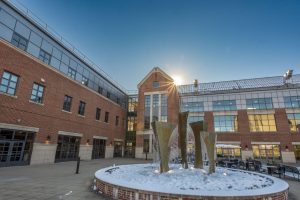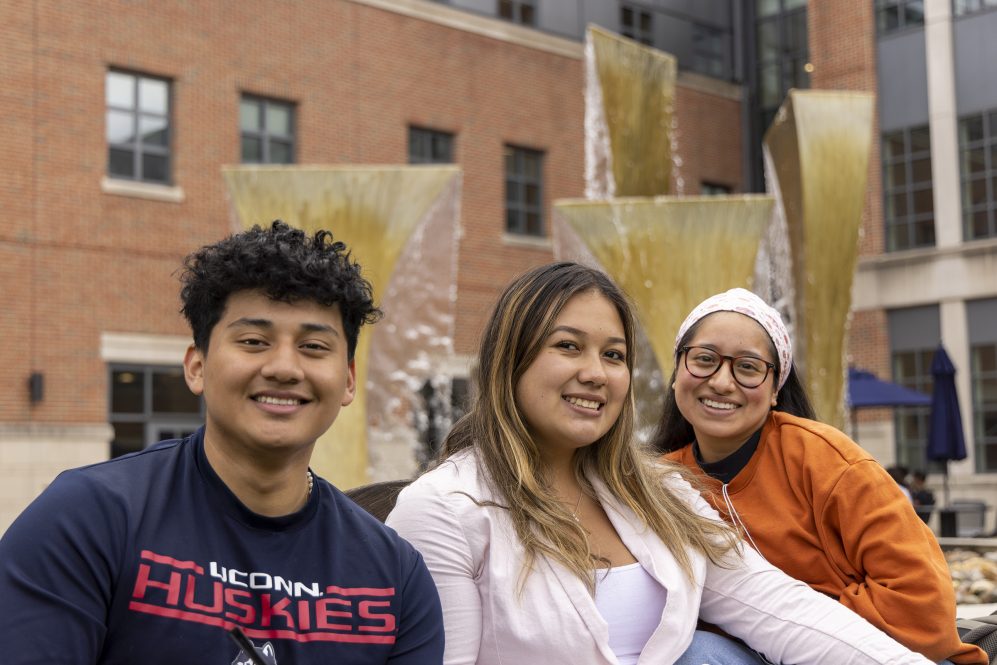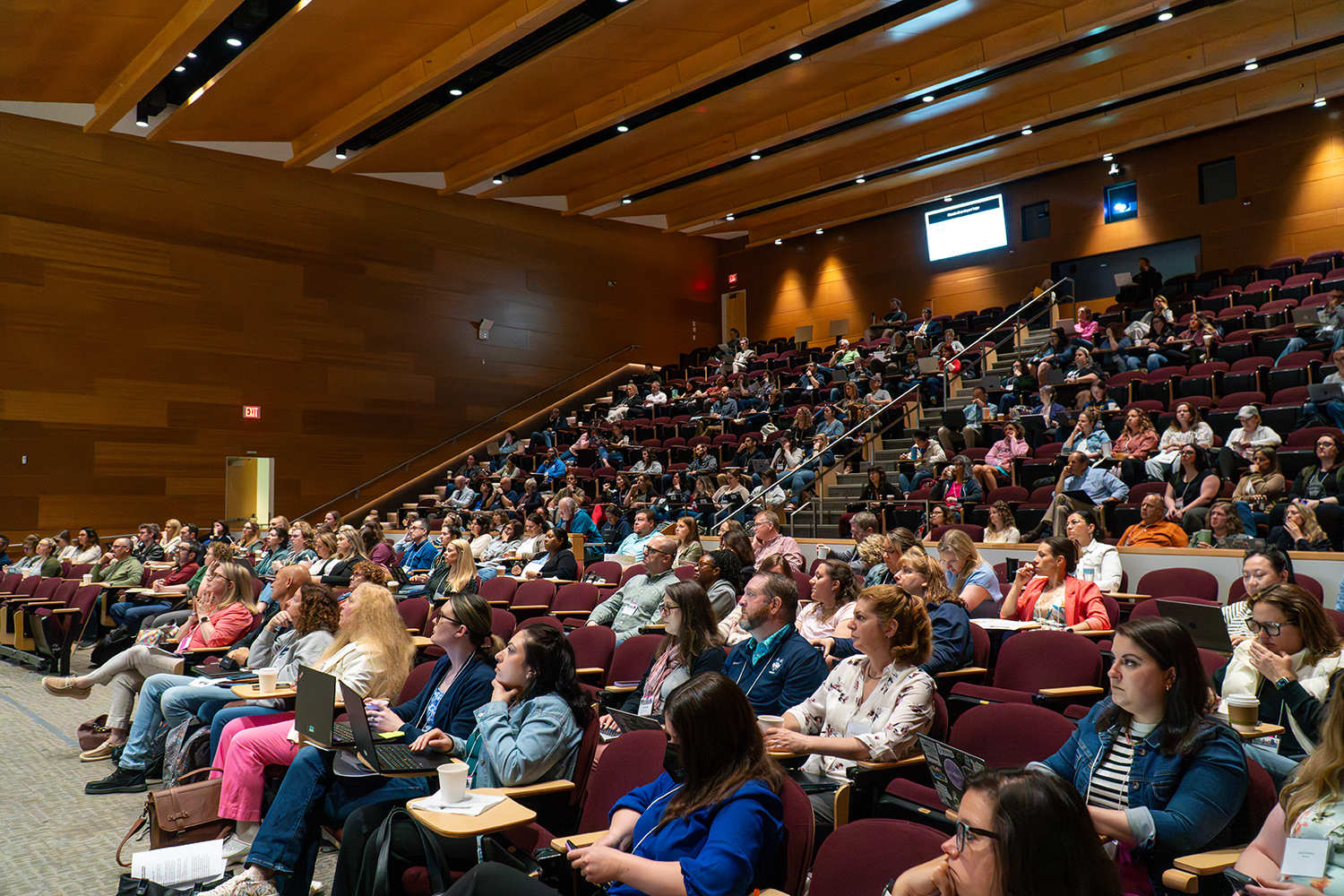UConn Waterbury and UConn Stamford are pioneering the UConn Agriculture, Health and Natural Resources Fellows Program (or the CAHNR Fellows Program), designed to support underrepresented students in the fields of food, agriculture, natural resources, and human sciences. With $4.5 million in funding from the U.S. Department of Agriculture’s National Institute of Food and Agriculture (NIFA), the initiative will sponsor about 30 undergraduate student fellows in cohorts on both campuses.
The program’s resources will include a robust scholarship portfolio; experiential learning opportunities such as paid internships and research placements; cultural, academic, research, and career development programs at both campuses; and professional networking opportunities for all fellows.
“It gives students firsthand knowledge of what’s required to have a career in those fields, and hopefully apply that classroom knowledge to real-life experiences,” says the program’s co-Principal Investigator (co-PI) and co-director Kristen Govoni, Associate Dean for Academic Programs in CAHNR. “They will receive academic support, soft skills, and mentoring from peers, faculty, and staff. They will also have exposure to career opportunities within those fields.”
One of CAHNR’s key priorities is training the next generation of agriculture, health, and natural resources professionals. With approximately 20-30% of the federal workforce eligible for retirement in the coming years, according to Govoni, there is an urgent need for knowledgeable workers to launch careers in these fields.
Across all of its campuses, UConn is ideally positioned to create opportunities for students entering these disciplines, thanks to CAHNR’s nationally renowned academic programming and the UConn Extension network of community outreach initiatives. UConn Waterbury and UConn Stamford, both considered Hispanic-serving institutions (HSIs), were prioritized for support as part of a broader effort to increase opportunities for Hispanic students and students of color. UConn Storrs is also involved in the program as a partner institution.

“The USDA has been making a major push to increase and diversify the workforce, and this is their flagship project,” says program PI and co-director Fumiko Hoeft, director of the UConn Waterbury campus. “It is a fantastic opportunity to provide financial and programmatic support to our students in the area of STEM.”
In Waterbury, the initiative will leverage partnerships with the national nonprofit Green Our Planet and Waterbury Public Schools (WPS) to install sustainable, educational hydroponic garden systems in K-12 public schools. Green Our Planet currently runs the largest school hydroponics program in the country, operating in 37 states, with the goal of empowering the next generation of scientists, conservationists, farmers, chefs, nutritionists, and entrepreneurs.
“Green Our Planet is honored to partner with UConn Waterbury on this groundbreaking project,” says Ciara Byrne, Green Our Planet’s co-founder and co-CEO. “Many national studies have shown that the experiential learning opportunities at the heart of this program are key to getting underrepresented students interested and engaged in food, agriculture and human sciences.”
UConn CAHNR faculty and CAHNR Fellows will teach WPS students about urban agriculture using Green Our Planet’s national science standard-aligned curriculum. Fellows will also have the opportunity to intern with Green Our Planet at their headquarters in Las Vegas, Nev.
“The district looks forward to a partnership that will help empower students at Waterbury to learn more about agriculture and hydroponic garden systems,” says Waterbury Public Schools Superintendent Verna D. Ruffin. “Waterbury Public Schools is always looking to bring innovative resources to our students. This program will allow students to harvest within our community and cultivate a passionate for agriculture.”
“We have had a great relationship with UConn and the Waterbury Campus for many years,” adds Waterbury Mayor Neil O’Leary. “This grant aligns perfectly with many of our city’s goals, and we look forward to implementing these programs in collaboration with UConn Waterbury.”

At UConn Stamford, the CAHNR Fellows program will tap into the campus’s resources in the areas of health, nutrition, and urban agriculture. And, through community partnerships, students will have access to numerous related internships in the region.
“We are so excited about this grant opportunity for students attending UConn Stamford in a field related to agriculture, health, and natural resources,” says Stamford Mayor Caroline Simmons. “And, with all of the related internships through partners in the region, this grant will have great impact on the community and Fairfield County.”
CAHNR Fellows funding will be portable between UConn campuses, allowing students to begin their degrees at UConn Waterbury or Stamford and later change to the Storrs campus.
“One of the things I like most about this initiative is that it is finding a way to really support our students on regional campuses – and for those that change campuses, making sure they have the support and resources necessary for a successful transition,” Govoni says. “It’s supporting students from entering campus all the way through to job placement – it’s not just one little piece.”
Students who are interested in joining the first cohort of CAHNR Fellows can apply online. Application review will begin July 1, 2023, and continue until spots are full. Incoming first-year students at UConn Waterbury and UConn Stamford who have a major in CAHNR are eligible. Students will remain CAHNR Fellows for four years, contingent on remaining a major in CAHNR or in a relevant career path.
For more information, visit https://cahnr.uconn.edu/fellows-program/ or email CAHNRacademics@uconn.edu.
In addition to PI Hoeft and co-PI Govoni, the program’s other co-PIs include Jennifer Orlikoff, Director of the UConn Stamford campus; Tadarryl Starke, UConn’s Associate Vice Provost for Student Success; Tamara Kaliszewski, Assistant Professor in Residence in the Department of Allied Health Sciences on UConn’s Waterbury campus; and Jeantyl Norze, Extension Associate Professor of Organizational Accountability and Evaluation for the University of Arkansas System Division of Agriculture. Other key UConn personnel include William Davenport, Jacqueline Kowalski, Michael Puglisi, Mayra Rodriguez Gonzalez, Melisa Argañaraz Gomez, and Cristina Connolly.
This work is supported by the USDA’s National Institute of Food and Agriculture “From Learning to Leading: Cultivating the Next Generation of Diverse Food and Agriculture Professionals Program (NEXTGEN).”



